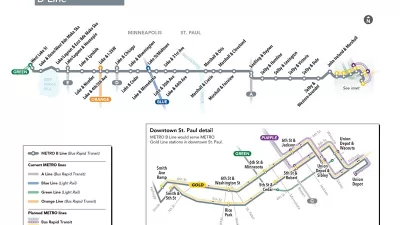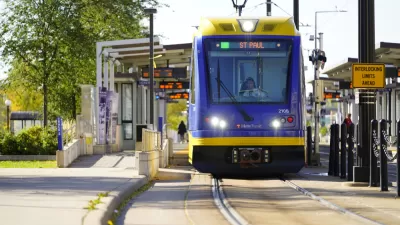Recognizing that providing transit passes to students costs about the same as operating a system of buses in-house, some schools are giving students access to public transit.
"This year, St. Paul Public Schools (SPPS) launched a pilot program to study how feasible it may be to send their high school students to and from school via city bus," reports Kritoffer Tigue. "And if the program proves successful, St. Paul may soon be joining Minneapolis in doing away with most yellow buses for their public high schools."
The program, the result of a partnership between SPPS and Metro Transit, allows students "to ride city buses to and from school, as well as for personal use over the weekend." School officials have proposed several potential benefits of the program: first is more flexibility for students participating in a number of after-school activities. Also, "officials say the program will also help break down barriers for students of color and low income families, who often can’t participate in certain activities or obtain work because of a lack of good transportation options."
SPPS is far from the first school district to choose public transit over yellow buses. According to Tigue, "Minneapolis Public Schools began using city buses for student transportation for five of their high schools in 2012, but upped it to seven the following year. This year, around 6,500 MPS high school students are using their Student Pass program, according to Metro Transit, and another 40 schools throughout the metro region are buying into the program by the end of the year."
Although the benefits to the student population are well documented in the article, the potential benefits to short- and long-term ridership, revenues, or route planning are potential avenues of study stemming from programs like those located in Twin Cities.
FULL STORY: St. Paul becomes latest district to study doing away with school buses

Planetizen Federal Action Tracker
A weekly monitor of how Trump’s orders and actions are impacting planners and planning in America.

Congressman Proposes Bill to Rename DC Metro “Trump Train”
The Make Autorail Great Again Act would withhold federal funding to the system until the Washington Metropolitan Area Transit Authority (WMATA), rebrands as the Washington Metropolitan Authority for Greater Access (WMAGA).

The Simple Legislative Tool Transforming Vacant Downtowns
In California, Michigan and Georgia, an easy win is bringing dollars — and delight — back to city centers.

The States Losing Rural Delivery Rooms at an Alarming Pace
In some states, as few as 9% of rural hospitals still deliver babies. As a result, rising pre-term births, no adequate pre-term care and "harrowing" close calls are a growing reality.

The Small South Asian Republic Going all in on EVs
Thanks to one simple policy change less than five years ago, 65% of new cars in this Himalayan country are now electric.

DC Backpedals on Bike Lane Protection, Swaps Barriers for Paint
Citing aesthetic concerns, the city is removing the concrete barriers and flexposts that once separated Arizona Avenue cyclists from motor vehicles.
Urban Design for Planners 1: Software Tools
This six-course series explores essential urban design concepts using open source software and equips planners with the tools they need to participate fully in the urban design process.
Planning for Universal Design
Learn the tools for implementing Universal Design in planning regulations.
Smith Gee Studio
City of Charlotte
City of Camden Redevelopment Agency
City of Astoria
Transportation Research & Education Center (TREC) at Portland State University
US High Speed Rail Association
City of Camden Redevelopment Agency
Municipality of Princeton (NJ)





























